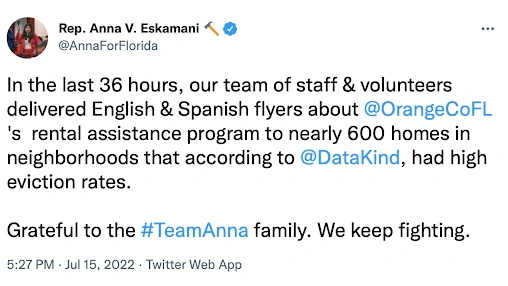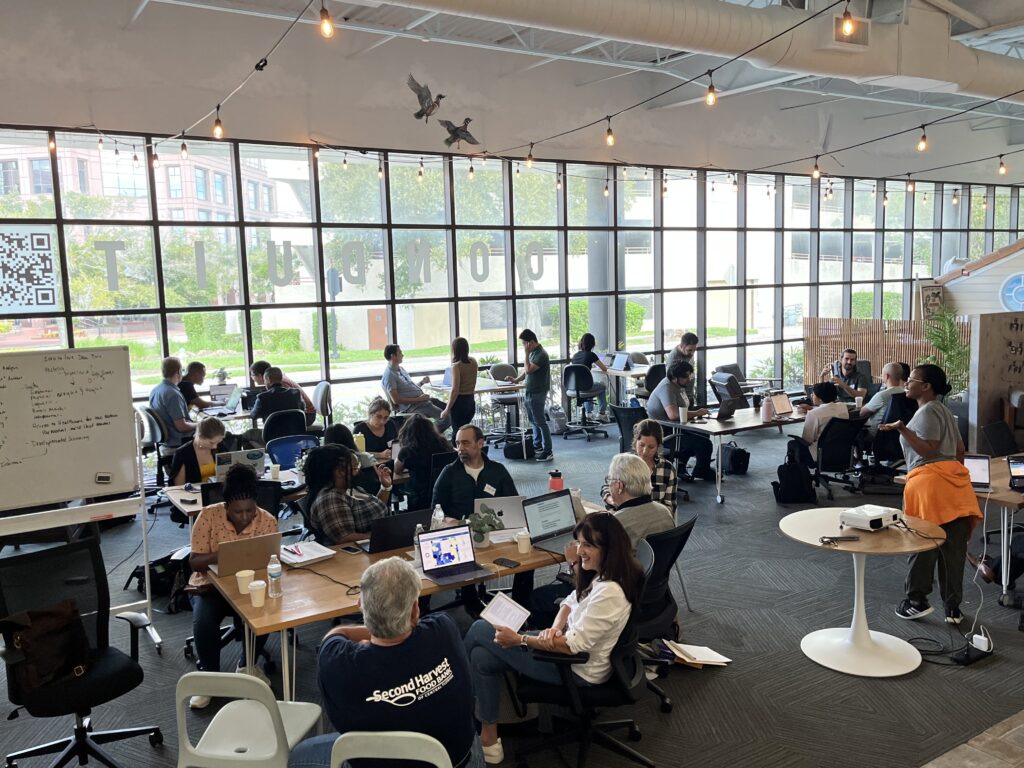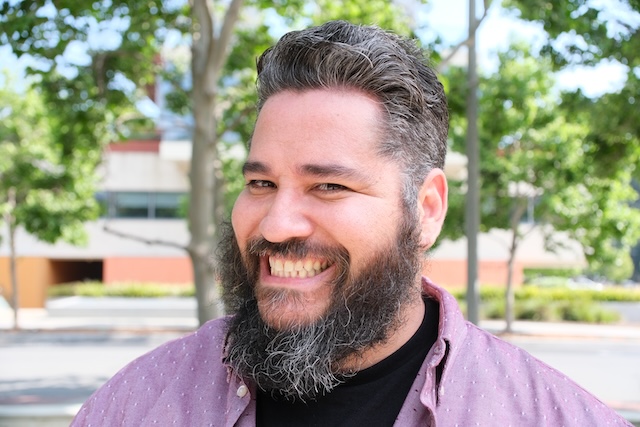“It’s crazy to ask the Central Florida community to fight today’s social sector challenges with yesterday’s tools.” ~Mark Brewer, CEO, Central Florida Foundation
Central Florida is a near-perfect data innovation hub. Due to the region’s demographic, economic, ethnic, industrial, racial, and political diversity, Central Florida offers a datascape that’s a microcosm of America. We continue to find that the innovations developed in the region have a very high success rate when exported to towns and cities across the U.S.
DataKind is doubling down on our commitment to Central Florida. In the coming months, you’ll see DataKind build bigger partnerships, work more closely with local business, government, and social sector leaders, join area associations and boards, and take to the stage wherever invited. If you know of or are a potential project partner, thought leader, connector, or funder, reach out to us with ideas of how we might best help accelerate the pace of impact in your organization or community with the power of AI, data science, and other advanced technologies. Because we too believe it’s crazy to ask the Central Florida community (and nation) to fight today’s social sector challenges with yesterday’s tools.
.webp)
Earlier this month, DataKind’s VP Product and Programs (and Orlando native), Dr. Caitlin Augustin, in collaboration with Central Florida Foundation, hosted an Art of the Possible webinar (view recording here) that asked the question: What if the same advanced technology that is driving today’s record business profits could be used to drive Central Florida social sector impact?
The webinar brought together over 1,000 mission-driven professionals from around Central Florida, the US, and the world, who gathered to learn how AI and data science can be leveraged to rapidly transform their organizations.
The following week, a dozen of Central Florida’s leading nonprofits and government agencies joined in-person with Dr. Augustin at the Foundation’s Orlando offices for a two-hour Discovery Day seminar to discuss the specifics of how data and data science can dramatically accelerate the pace of their organizations’ impact.
These events are a continuation of Central Florida work that DataKind started nearly three years ago, which has resulted in the investment of over $3,000,000 in critically needed data science capacity into the region’s social sector. This investment has helped build a vibrant community of program partners including major national and regional foundations joining with our boots-on-the-ground network of local mission-driven organizations.
Here are a few examples of the impact our work is having together in Central Florida:
Reducing Foster Care Case Worker Burnout in Central Florida
DataKind worked with the foster care provider, Community Based Care of Central Florida, which was experiencing very high burnout rates among their caseworkers that exceeded 40% annually.
This turnover, which appeared to be casework overload, was actually attributed to poor scheduling practices and the many wasted hours traveling between appointments as opposed to spending one-on-one time with their clients.
Impact: Understanding this, DataKind created a scheduling algorithm that reduced travel distances by as much as 30 miles/day, and saved $2,025/day in associated travel costs across the organization’s 150 caseworkers. It also added hours of one-to-one foster care time and many more smiles.
Predicting Housing Loss in Central Florida Before the Eviction Notice Arrives
Many Central Florida citizens are eligible for Federal emergency rent subsidies, but for a number of reasons, these families are unaware of the availability or how to access these funds. This leaves local relief organizations having to canvas every city district door-to-door to identify and inform eligible households of their available benefits.
What if these same organizations could be handed a data-assisted map that shows the neighborhoods where evictions and foreclosure have historically been highest for highly targeted outreach?
DataKind built the open-source Foreclosure and Eviction Analysis Tool (FEAT) that helps local policymakers, community-based organizations, and relief organizations identify where housing loss is most acute, when during the year housing loss is occurring, and who is most impacted and deliver emergency rental relief to at-risk homes across Central Florida before foreclosures and evictions can happen.

Impact: According to Florida State Representative, Anna Eskamani, the FEAT tool helped her team reach, in three days, over 600 constituents who were at risk of housing loss and deliver emergency rental assistance.
Altering the Trajectory of Thousands of Central Florida Girls’ Lives Forever
Back in 2007, more girls in Duval County, FL were being locked up than in Miami, Ft. Lauderdale, and Tampa combined. Girls were being sent to commitment programs far from their homes and subjected to horrific abuse. Only large-scale, researched-based reform could alter the trajectory of thousands of girls’ lives forever.
By accessing and using timely and trustworthy data to advance key bodies of work, The Delores Barr Weaver Policy Center has been able to ground their work in the lived experiences of girls and young women. However, the process of accessing, extracting, transforming, and assessing this crucial data is a deeply resource-intensive, bespoke process.
Impact: DataKind automated The Policy Center’s data intake to help them make sense of their myriad data streams and created easy-to-use visualizations, removing a key resourcing bottleneck. This allowed The Policy Center to reallocate resources and staff capacity to helping serve more individuals.
Contact DataKind’s Constituent Engagement Lead, Quentin Walz, at quentin@datakind.org.



